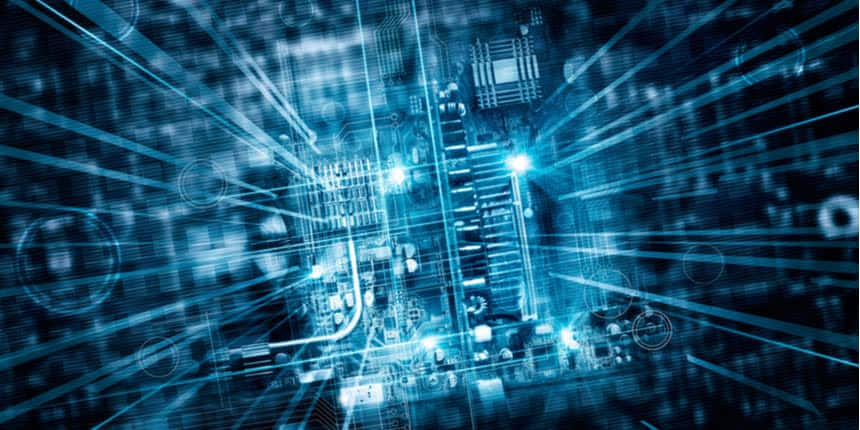East Point College of Engineering & Tech. Admissions 2025
Apply for B.E at East Point College of Engineering and Technology | Use Code : Careers360 & Avail 50% Off on Application Forms | Last Date: 19th Apr’25
B Tech in Power Electronics is a technology that deals with the conversion and control of electrical power with high-efficiency of switching mode electronic devices for a wide range of applications. The duration of the B Tech in Power Electronics undergraduate engineering course is for four years which is divided into eight semesters. B Tech in power electronics engineering is a part of electronics engineering that deals with a new kind of industrial revolution because of its important role in utility energy storage, energy conservation, renewable energy systems, and electric and hybrid vehicles.

B Tech in power electronics engineering is the best combination of electronics power, management, and economics. The specialisation in B Tech power electronics covers every area of electronics engineering and power engineering.
Particulars | Values |
Degree Name | B. Tech in Power Electronics |
Degree Type | Undergraduate |
Degree Duration | Four years |
Entrance Exams | JEE Main, JEE Advance, BITSAT, SRM JEE, WBJEE |
Eligibility Criteria | 10+2 (with Physics, Mathematics, and Chemistry with minimum 50 per cent marks) |
Admission process | Entrance Exam |
Average fees for the entire duration | Rs. 2,00,000 to Rs 8,00,000 |
Average Salary | Rs. 4 LPA |
Job profiles | Power Transformer Executives, Power Engineering Supervisor, Power Electronics Engineer, Electrical Engineers, and Test Engineer |
Top recruiters | BEL, BHEL, DRDO, HAL, Delhi Metro Rail Corporations, Indian Space Research Organization, NTPC, Power Grid Corporation, NHPC, Jindal Steel & Power, Reliance Energy, and Alstom |
The B Tech in power electronics eligibility criteria are different for top colleges/universities and to give admission to the B Tech in power electronics is based on the entrance examinations. Here is the list of some common B Tech in power electronics eligibility criteria that every candidate should keep in mind.
To get admission for B Tech in Power Electronics Engineering course at top and reputed colleges candidates need to follow the below-mentioned admission procedure:
Apply for B.E at East Point College of Engineering and Technology | Use Code : Careers360 & Avail 50% Off on Application Forms | Last Date: 19th Apr’25
Accorded Institution of Eminence by MoE, Govt. of India | NAAC A++ Grade | Ranked #4 India by NIRF 2024 | 200+ Recruiters
For engineering courses, a number of entrance examinations are held in universities and colleges. Below is the list of top exams for B Tech in Power Electronics Engineering.
Exam Name | Level | Conducting Body | Exam Schedule |
|---|---|---|---|
National | National Testing Agency | ||
National | Indian Institute of Technology Bombay | ||
State | West Bengal Joint Entrance Examinations Board |
B Tech Power Electronics Engineering cut-off score is a deciding factor in students’ admission to a particular university or college. B Tech Power Electronics cutoff varies on numerous factors, such as the number of applicants who appear for the entrance examinations, the difficulty level of the entrance examination, and the previous year's cutoff.
B Tech Power Electronics fees vary depending on the college or university that you attend. Before enrolling in any particular college, students should check the B Tech Power Electronics fee structure. The fees may also change if the candidate is eligible for getting a scholarship from the government. The average B Tech Power Electronics fee is Rs. 5 lakhs.
The Bachelor of Technology in Power Electronics programme focuses on making technology work in any electronic system flawlessly. The degree opens up a wide range of prospects for design engineers and electrical engineers due to its broad field of applications. Graduates of BTech programmes are equipped for opportunities in a variety of businesses that pay well. Furthermore, individuals can apply their creative talents in professional sectors. There are numerous career prospects in the business for B Tech power electronics graduates.
Graduates could become power technicians, electrical engineers, or even supervisors. Among the most significant employers of these graduates are workers in the power and telecommunications industries. The subject is predicted to grow rapidly in the next years, and students seeking this degree can choose from a variety of options.
There are numerous possibilities available to students, if they want to become an electrical engineer or a power electronic specialist. Power electronics engineers are in high demand and will have plenty of job prospects following graduation. Below are a few employment choices available to graduates with a degree in this discipline.
Power electronics engineer: As a Power Electronics engineer, have to design and test circuits to use in power electronics systems. Power electronics may develop prototypes, collaborate with other engineers to perform cross-functional tasks when testing designs, and find solutions for known flaws in mechanical designs
Electronics Engineer: Electronics Engineers need to provide technical and customer support for electronic components on-site. In this role, Installation, inspection, and repair of electronic equipment and components are part of their work. Performing diagnostic and maintenance services is also the responsibility of the electronics engineer. Calibrate, adjust and maintain test equipment.
Test Engineer: Test Engineer work involves testing new applications and Software and Interpreting results. These engineers provide test result information to other team members to improve product and service quality. Troubleshooting and resolving bugs.
Power Transformer Executives: Power Transformer executives will work on power generation and power plants, especially with transformers, handling related problems and giving appropriate solutions are one of the most important work of power transformer executives.
Senior Supervisor: A senior supervisor is responsible for managing the staff's work and ensuring that employees are completing their work on time. He or she will supervise the work and inform the report to the project manager or team leaders.
Top Recruiters for B Tech Power Electronics Engineering
BEL | Reliance Energy |
BHEL | Alstom |
DRDO | ABB |
HAL | Ameren Corporation |
Delhi Metro Rail Corporations | American Electric Power |
NHPC | Black & Veatch |
The Bachelor of Technology in Power Electronics programme provides multiple job choices. Students holding a Bachelor of Technology can continue their studies with a Master's degree. The programme has great job prospects, with most graduates working in the energy business. Graduates can expect to work with cutting-edge technology in addition to rewarding professions. Students with a B.Tech in Power Electronics degree can work as electrical engineers or power technicians.
The training provides several job options in various sectors, as well as good pay and positions. Graduates of a BTech in Power Electronics programme can also pursue an MBA. Graduates will have a variety of professional opportunities. Electrical engineers will be at the forefront of innovation and improvement for the upcoming generation in the area of electrical and electronics engineering. Starting pay is good, and studies show that future job opportunities are outstanding.
The salary of a B Tech in Power Electronics graduate candidate depends on the job role and skills acquired by every respective individual. The salary may change based on the job location, job profile, and experience. These engineers have an opportunity to work both in the government and private sectors. Below is the table mentioned with job roles and salary figures.
Job Profile | Annual Salary |
Power electronics engineer | Rs 4.7 Lakhs |
Electronics Engineer | Rs 2.5 Lakhs |
Test Engineer | Rs 4.4 Lakhs |
Power Transformer Executives | Rs 4.6 Lakhs |
Senior Supervisor | Rs 3.6 Lakhs |
The age limit is depending on the colleges in which candidates are going to take admission. The minimum age for entrance examinations is 17 years.
Power engineering deals with the generation, transmission, distribution, and utilization of electrical energy and power electronics deals with automotive applications.
B.Tech in Power Electronics is a technology that deals with the conversion and control of electrical power with high-efficiency switching mode electronic devices for a wide range of applications. The duration of this undergraduate engineering course is 4 years which is divided into eight semesters.
According to the eligibility criteria, candidates should pass the higher secondary examination (10+2) with physics, chemistry, mathematics and English or an equivalent examination.
JEE Main, JEE Advanced, IPU-CET, WBJEE are some of the top engineering entrance examinations.
B.Tech in power electronics engineering will have good demand and it is a great opportunity for all those candidates who want to make their career in the power engineering sector. According to the data available, in India, there are nearly 13 engineering institutions that are creating nearly 750 power electronics engineers.
The top five institutes that offer B.Tech in Power Electronics: Amity School of Engineering and Technology, Noida, Amrita Vishwa Vidyapeetham, Bengaluru Campus, Guru Nanak Dev University Regional Campus, Sathiala, Jaypee Institute of Information Technology, Noida, and JIMS Engineering Management Technical Campus, Greater Noida.
Application Date:03 September,2024 - 16 April,2025
Hello,
I can keep you posted about the date of the upcoming BE/BTech exams, and as and when necessary, update you on other information; however, if you seek continuous, up-to-the-minute information relevant to your engineering exams, then it would be a good option to subscribe to services provided by Careers360. It provides broad coverage in respect of entrance exams regarding college admissions; this is well-come for notification, registration date, the final application form submission dates along with a schedule and important dates pertaining to several tests including those for Engineering including JEE Main and Advance, BITSAT, VITEEE, and those of their state versions that include MHT CET as well as AP EAMCET.
I can assist you with specific exam overviews, syllabus, and preparation strategies whenever you need it.
Hello there,
IIT Delhi offers a variety of B.Tech and dual degree programs across multiple engineering disciplines. As of the latest information, here are the undergraduate programs available at IIT Delhi:
1. B.Tech Programs:
- Computer Science and Engineering
- Electrical Engineering
- Mechanical Engineering
- Civil Engineering
- Chemical Engineering
- Engineering Physics
- Production and Industrial Engineering
- Textile Technology
- Biochemical Engineering and Biotechnology
- Mathematics and Computing (B.Tech and M.Tech Dual Degree)
- Engineering and Computational Mechanics
2. Dual Degree Programs (B.Tech + M.Tech):
- Biochemical Engineering and Biotechnology
- Chemical Engineering
- Electrical Engineering (Power and Automation)
These offerings can change, so it's always good to check the latest information on the official IIT Delhi website or the Joint Seat Allocation Authority (JoSAA) portal.
Hello there,
IIT Kanpur offers a variety of B.Tech and dual degree programs across different departments. As of the latest information available, the following B.Tech and dual degree (B.Tech-M.Tech) programs are offered at IIT Kanpur:
1. Aerospace Engineering (AE)
2. Biological Sciences and Bioengineering (BSBE)
3. Chemical Engineering (CHE)
4. Civil Engineering (CE)
5. Computer Science and Engineering (CSE)
6. Electrical Engineering (EE)
7. Materials Science and Engineering (MSE)
8. Mechanical Engineering (ME)
Additionally, IIT Kanpur offers dual degree programs (B.Tech-M.Tech) in some of these disciplines, allowing students to earn both bachelor's and master's degrees.
For the most accurate and up-to-date information, you can check IIT Kanpur's official website or the Joint Seat Allocation Authority (JoSAA) counseling brochure.
Hi there,
hope you are doing fine
Yes, you can apply for any M.tech colleges in computer science field through GATE exams, some of the requirement you need to see that you must have Under graduate degree, Pursuing BE doesn't affect your eligibility, You may check some of the specific eligibility criteria of the colleges like IIT's in which you are interested, as some of them may have additional requirements.
With an SC category rank of 41,715 and a CRL rank of 570,173 in JEE Main, getting into NITs or top-tier IITs for B.E./B.Tech may be challenging. However, you might find options in state engineering colleges in Maharashtra, as they often have seats reserved for SC candidates with lower cutoff requirements compared to NITs. Look into state-level entrance options like MHT CET or other reserved category seats in Maharashtra’s government and private engineering colleges for better chances.

National level exam conducted by VIT University, Vellore | Ranked #11 by NIRF for Engg. | NAAC A++ Accredited | Last Date to Apply: 7th April | NO Further Extensions!

Ranked #42 among Engineering colleges in India by NIRF | Highest CTC 50 LPA , 100% Placements

Gateway for admissions to Engineering courses @ Symbiosis | NAAC A++ Grade | Among top 31 in India (NIRF 2024)
Ranked #1 Among all Private Indian Universities in QS Asia Rankings 2025 | Scholarships worth 210 CR
100+ Industry collaborations | 10+ Years of legacy
Among Top 30 National Universities for Engineering (NIRF 2024) | 30+ Specializations | AI Powered Learning & State-of-the-Art Facilities